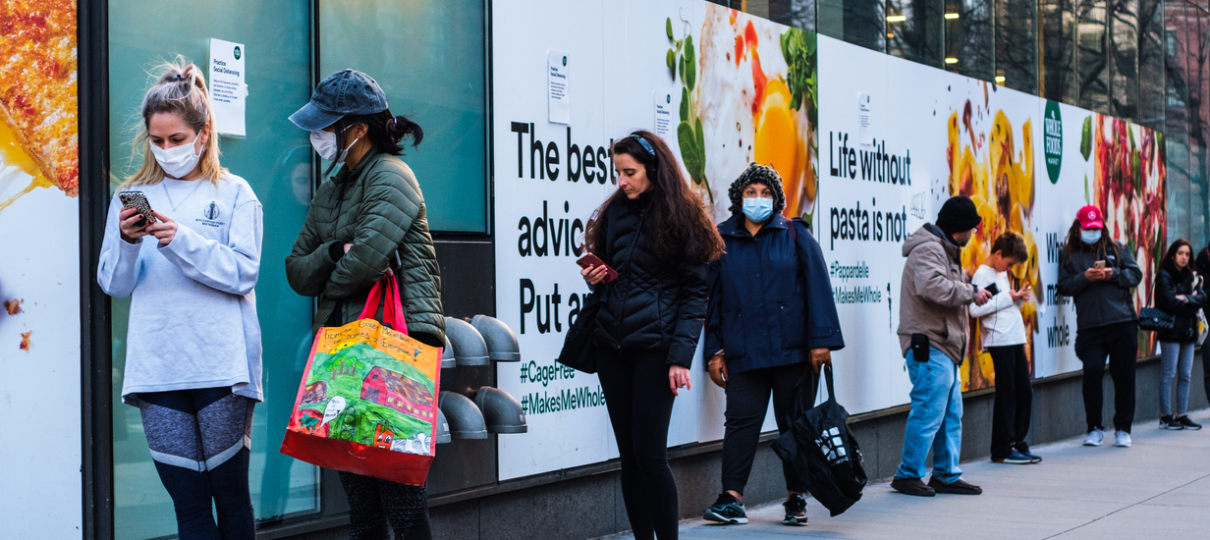Our latest study found 31% of unvaccinated adult Americans would get the COVID-19 vaccine if they were informed their health insurer would raise premiums on just the unvaccinated.
We also found 80% of Americans have required medical attention after dealing with "long COVID" and not all of their costs were covered by their insurer, breaking form with almost all insurers previously waiving COVID-19 medical expenses.
Both findings raise questions about how insurance companies will handle COVID-19-related costs now and in the future as it becomes clear the virus will remain with us to some degree even if it can be largely prevented through the vaccine.
Some background info:
- As of November 2020, the Peterson-KFF Health System Tracker found 88% of people enrolled in fully insured private health plans would have had any COVID-19 out-of-pocket costs waived. On August 19th, 2021, that same organization found "72% of the two largest insurers in each state and DC (102 health plans) are no longer waiving these costs, and another 10% of plans are phasing out waivers by the end of October."
- Some consumers are facing steep medical bills due to long COVID symptoms, and insurance companies aren't picking up the tab as the line becomes blurred as to what is a COVID-19-related cost and what is not.
If insurance costs went up for only the unvaccinated, one-third would get the vaccine
The various COVID-19 vaccines are proven to be effective, and an unvaccinated person simply poses a larger health risk to an insurance company than a vaccinated person.
When a person is more prone to medical issues, their insurance rates usually go up; that's how it has always worked.
So if insurers decided to raise premiums for only the unvaccinated to mitigate risk, would it push the unvaccinated to get the shot (or two)?
Note, the above question was asked only to unvaccinated respondents as of August 24th, which was 26% of our 1,000 poll participants (67% were vaccinated, 7% opted not to answer).
We asked two similar questions and the results came in about the same: about one-third of unvaccinated Americans would get the vaccine if insurance costs went up for just the unvaccinated.
- If your health insurer informed you that they would no longer waive COVID-19-related medical costs for the unvaccinated and instead pass the costs back to you to pay out-of-pocket, would you get the vaccine (vaccinated people would still have medical costs waived by their insurer)?
- 33% answered "yes"
- 67% answered "no"
- If your employer informed you that they would raise health insurance premiums for the unvaccinated, would you get the vaccine (vaccinated people wouldn’t have premiums raised)?
- 34% answered "yes"
- 66% answered "no"
Interesting. How would all Americans feel about insurance companies implementing such a pricing change?
Majority of Americans support such a change
For this next series of questions, we looped back in all 1,000 respondents and asked them how they would feel if insurance companies followed through with any of the above three hypotheticals.
And, here's how the results looked for the other two scenarios:
- Are you in favor of health insurers no longer waiving COVID-19 related medical costs for the unvaccinated and instead passing the out-of-pocket costs back to the consumer (vaccinated people would still have medical costs waived by their insurer)?
- 54% answered "yes"
- 47% answered "no" (note: percentages sometimes may not add up to 100% due to rounding)
- Are you in favor of employers raising health insurance premiums for the unvaccinated (vaccinated people wouldn’t have premiums raised)?
- 53% answered "yes"
- 47% answered "no"
When these results were broken down according to vaccination status, a much larger percentage of vaccinated respondents supported such a change from insurance companies, but not as large as one might think.
For example, 66% of vaccinated respondents answered "yes" to the first question found immediately above this paragraph, which is only a difference of 13 percentage points. 20% of unvaccinated respondents answered the same.
A recent survey from The Harris Poll found similar sentiments:
(51%) say they oppose employers charging unvaccinated employees more for their health insurance premiums to cover potential associated medical costs from contracting COVID while (49%) support the idea. As for vaccinated Americans, (61%) are in favor (vs. 27% unvaccinated) and (39%) oppose (vs. 73% unvaccinated).
Note: If you'd like to see the Breeze survey's raw data or data broken down by state, gender, race, age, etc., please email me at [email protected]
Long COVID, medical costs & the role of insurance companies
"Long COVID" refers to a variety of symptoms, like fatigue or mental cloudiness, someone might feel for months after being infected with the COVID-19 virus.
Sometimes these symptoms require medical attention, but are they "COVID-19-related costs" that were being waived by insurers? It's a grey area, and an interesting topic to explore.
With long COVID likely lingering for years to come, can consumers expect their related medical bills to be waived by insurance companies?
According to our survey results, no.
And if it wasn't happening before with our respondents, it definitely won't be happening in the future as insurance companies now stop waiving COVID-19-related costs.
Let's dive in: 32% of our respondents contracted COVID-19, 63% did not, and 5% opted not to say.
Within that 32%, 75% indicated they came down with long COVID afterward, while 18% did not, and 5% opted not to say. This falls in line with previous studies that found 76% of COVID-19 patients were still experiencing symptoms six months after getting sick.
Within that 75% that came down with long COVID, 80% said the symptoms required medical attention, while 18% said they did not, and 3% opted not to say.
So amongst the 80% that required medical attention due to long COVID symptoms, how many had out-of-pocket costs that were not covered by their insurer?
Most of them.
Amongst those that had out-of-pocket medical costs due to long COVID, the average out-of-pocket expense was $643.
When asked why these long COVID costs were not covered by insurance, the most populated answers were:
- "I exceeded a cap on doctor visits that are covered by my insurer." (68%)
- "I had the usual coinsurance expense." (42%)
- "I required specialists/medical professionals that were not covered by my insurer." (38%)
How did this group of respondents then cover their out-of-pocket expenses related to long COVID?
While the plurality were able to rely on emergency savings, 20% had to turn to debt.
Amongst that group, we found the average amount of debt incurred to be $919.
If you're interested in learning more about paying medical bills after insurance, check out this guide: 5 best practices for paying hospital bills after insurance
Should you take out disability insurance because of COVID or long COVID?
Disability insurance is a type of insurance coverage that replaces a portion of your monthly income if injury or illness prevents you from working.
There are two types of disability insurance policies: short term and long term. Short term disability insurance replaces a percentage of your income if you are out of work due to an injury or sickness that will only keep you unable to work for a short time. Short term disability benefits usually last between three and six months.
Long term disability insurance also replaces a portion of your income but it's meant for injuries or sicknesses that will keep you out of work for more than three months or even permanently. Typical benefit periods for this type of policy can be two, five, or ten years.
When it comes to using disability insurance as a way to protect your income if you wind up out of work due to COVID-19 or long COVID, you'd likely be referring to short term disability insurance.
Is it worth it to apply for such a policy?
Our survey found 3% of respondents who had out-of-pocket medical costs due to long COVID were able to rely on a disability insurance policy to help cover costs.
Despite only being used by a limited number of consumers, it's clear that disability insurance did serve a useful purpose for those respondents that had it and were kept out of work due to long COVID.
We also asked the 995 respondents who were not part of that 3% if they have considered taking out a disability insurance policy in case they are kept out of work due to COVID-19.
A combined 42% indicated they considered it, with 9% still with a pending application, 4% who took out a policy, and 3% who were rejected.
Conversely, a combined 54% have not considered it, with 11% having never even heard of it and 10% not knowing enough to make a confident decision.
Based on those results, it wouldn't hurt many consumers to at least look into disability insurance to learn what it is and what it covers because it seems a lack of consumer education around the product might be preventing some people from becoming policyholders.
Other than disability insurance, there are other products that might be able to help someone who has out-of-pocket medical expenses that they are struggling to afford. For example, they could look into supplemental health insurance or hospital indemnity insurance.
If you're employed, you could also look into if your employer offers any ancillary benefits, which could include disability insurance or critical illness insurance.
Alternatively, you could get really outside the box and look into something like crowdfunding for medical expenses.
Get a personalized disability quote in seconds.
Methodology
All data found within this report derives from a survey commissioned by Breeze and conducted online by survey platform Pollfish. In total, 1,000 adult Americans were surveyed. The appropriate respondents were found via Pollfish’s age filtering feature. This survey was conducted on August 24th, 2021. All respondents were asked to answer all questions truthfully and to the best of their abilities.
Note: If you'd like to see the raw data or data broken down by state, gender, race, age, etc., please email me at [email protected]
Survey results
Note: Results may not add up to 100% due to rounding.
Q1. (All respondents) Have you contracted COVID-19 at any point during the pandemic?
- 32% of respondents answered "yes"
- 63% of respondents answered "no"
- 5% of respondents answered "I'd rather not say."
Q2. (If "yes" to Q1) “Long COVID” refers to symptoms that linger for weeks or months beyond infection. Since contracting COVID-19, have you experienced any “long COVID” symptoms like (but not limited to) difficulty breathing or shortness of breath, tiredness or fatigue, difficulty thinking or concentrating, cough, chest and/or stomach pain, headache, heart palpitations, joint and/or muscle pain, sleep problems?
- 75% of respondents answered "yes"
- 18% of respondents answered "no"
- 6% of respondents answered "I'd rather not say."
Q3. (If "yes" to Q1 & Q2) Have these “long COVID” symptoms required professional medical attention?
- 80% of respondents answered "yes"
- 18% of respondents answered "no"
- 3% of respondents answered "I'd rather not say."
Q4. (If "yes" to Q1, Q2, & Q3) Did you have out-of-pocket medical costs related to the “long COVID” symptoms (i.e. not covered by your health insurer)?
- 80% of respondents answered "yes"
- 19% of respondents answered "no"
- 1% of respondents answered "I'd rather not say."
Q5. (If "yes" to Q1, Q2, Q3, & Q4) What were your total out-of-pocket medical costs related to the “long COVID” symptoms?
- The average out-of-pocket medical cost was $643.
Q6. (If "yes" to Q1, Q2, Q3, & Q4) Why did your health insurer not cover the out-of-pocket medical costs related to the “long COVID” symptoms? (Select all that apply)
- 68% of respondents answered "I exceeded a cap on doctor visits that are covered by my insurer."
- 26% of respondents answered "I did not hit my deductible."
- 42% of respondents answered "I had the usual coinsurance expense."
- 35% of respondents answered "I had the usual copay expense."
- 38% of respondents answered "I required specialists/medical professionals that were not covered by my insurer."
- 31% of respondents answered "I had additional accommodation costs related to a hospital stay that were not covered by my insurer."
- 28% of respondents answered "I required additional professional/ancillary services not covered by my insurer (i.e. ambulance transport, inpatient evaluation).
- 24% of respondents answered "I required medicine not covered by my insurer."
- 1% of respondents answered "I don't have insurance."
- No respondents answered "other"
Q7. (If "yes" to Q1, Q2, Q3, & Q4) How did you cover the out-of-pocket medical costs related to the “long COVID” symptoms?
- 47% of respondents answered "I had emergency savings I was able to use."
- 20% of respondents answered "I had to take on debt (credit card, personal loan, etc.).
- 16% of respondents answered "My partner/spouse or other family member covered the additional costs."
- 3% of respondents answered "I had a disability insurance policy that helped cover costs as "long COVID" also kept me out of work."
- 5% of respondents answered "I had to sell stocks or draw from an investment/retirement account to cover the costs."
- 2% of respondents answered "I have ignoring the bills and not making payments."
- 7% of respondents answered "I was able to cover the costs comfortably and without having to do anything drastic."
- No respondents answered "other/none of the above"
Q8. (If "yes" to Q1, Q2, Q3, Q4, & "I had to take on debt" to Q7) How much debt did you take on as a result of the out-of-pocket medical costs related to “long COVID?"
- The average amount of debt taken on was $910.
Q9. (All respondents except those who answered "I had a disability insurance policy that helped cover costs as "long COVID" also kept me out of work." to Q7) Have you considered taking out a disability insurance policy to help with expenses in case you contract COVID-19 or “long COVID” and are kept out of work for an extended period of time?
- 26% of respondents answered "Yes, but I've only considered it."
- 9% of respondents answered "Yes, I applied for a disability insurance policy & am still waiting to hear back."
- 3% of respondents answered "Yes, I applied for a disability insurance policy, but was rejected."
- 4% of respondents answered "Yes, I took out a disability insurance policy."
- 11% of respondents answered "No, I've never heard of disability insurance."
- 29% of respondents answered "No, I've not considered it."
- 10% of respondents answered "No, I don't know enough about disability insurance to make a confident decision."
- 4% of respondents answered "No, I think disability insurance is a waste of money."
- 3% of respondents answered "I'd rather not say."
Q10. (All respondents) Have you gotten the COVID-19 vaccine so that you are fully vaccinated against the virus (antibodies do not count)?
- 67% of respondents answered "yes"
- 26% of respondents answered "no"
- 7% of respondents answered "I'd rather not say."
Q11. (If "no" to Q10) If your health insurer informed you that they would no longer waive COVID-19-related medical costs for the unvaccinated and instead pass the costs back to you to pay out-of-pocket, would you get the vaccine (vaccinated people would still have medical costs waived by their insurer)?
- 33% of respondents answered "yes"
- 67% of respondents answered "no"
Q12. (If "no" to Q10) If your health insurer informed you that they would raise premiums for the unvaccinated, would you get the vaccine (vaccinated people wouldn’t have premiums raised)?
- 31% of respondents answered "yes"
- 69% of respondents answered "no"
Q13. (If "no" to Q10) If your employer informed you that they would raise health insurance premiums for the unvaccinated, would you get the vaccine (vaccinated people wouldn’t have premiums raised)?
- 34% of respondents answered "yes"
- 66% of respondents answered "no"
Q14. (All respondents) Are you in favor of health insurers raising premiums for the unvaccinated (vaccinated people wouldn’t have premiums raised)?
- 50% of respondents answered "yes"
- 50% of respondents answered "no"
Q15. (All respondents) Are you in favor of health insurers no longer waiving COVID-19 related medical costs for the unvaccinated and instead passing the out-of-pocket costs back to the consumer (vaccinated people would still have medical costs waived by their insurer)?
- 54% of respondents answered "yes"
- 47% of respondents answered "no"
Q16. (All respondents) Are you in favor of employers raising health insurance premiums for the unvaccinated (vaccinated people wouldn’t have premiums raised)?
- 53% of respondents answered "yes"
- 47% of respondents answered "no"









